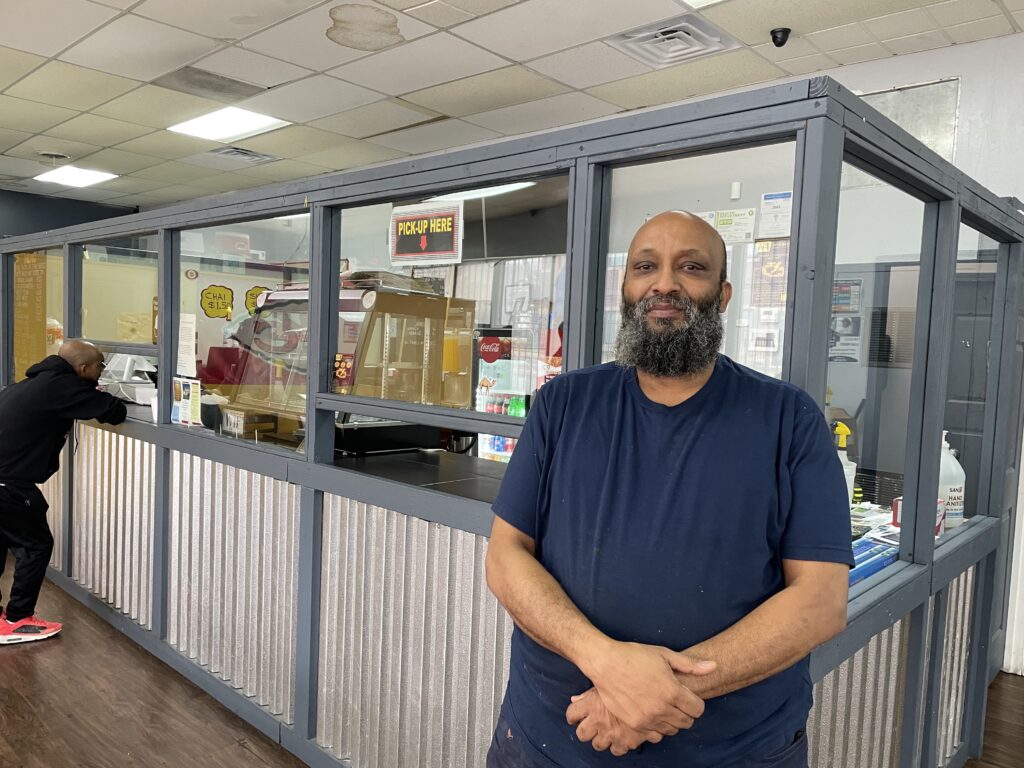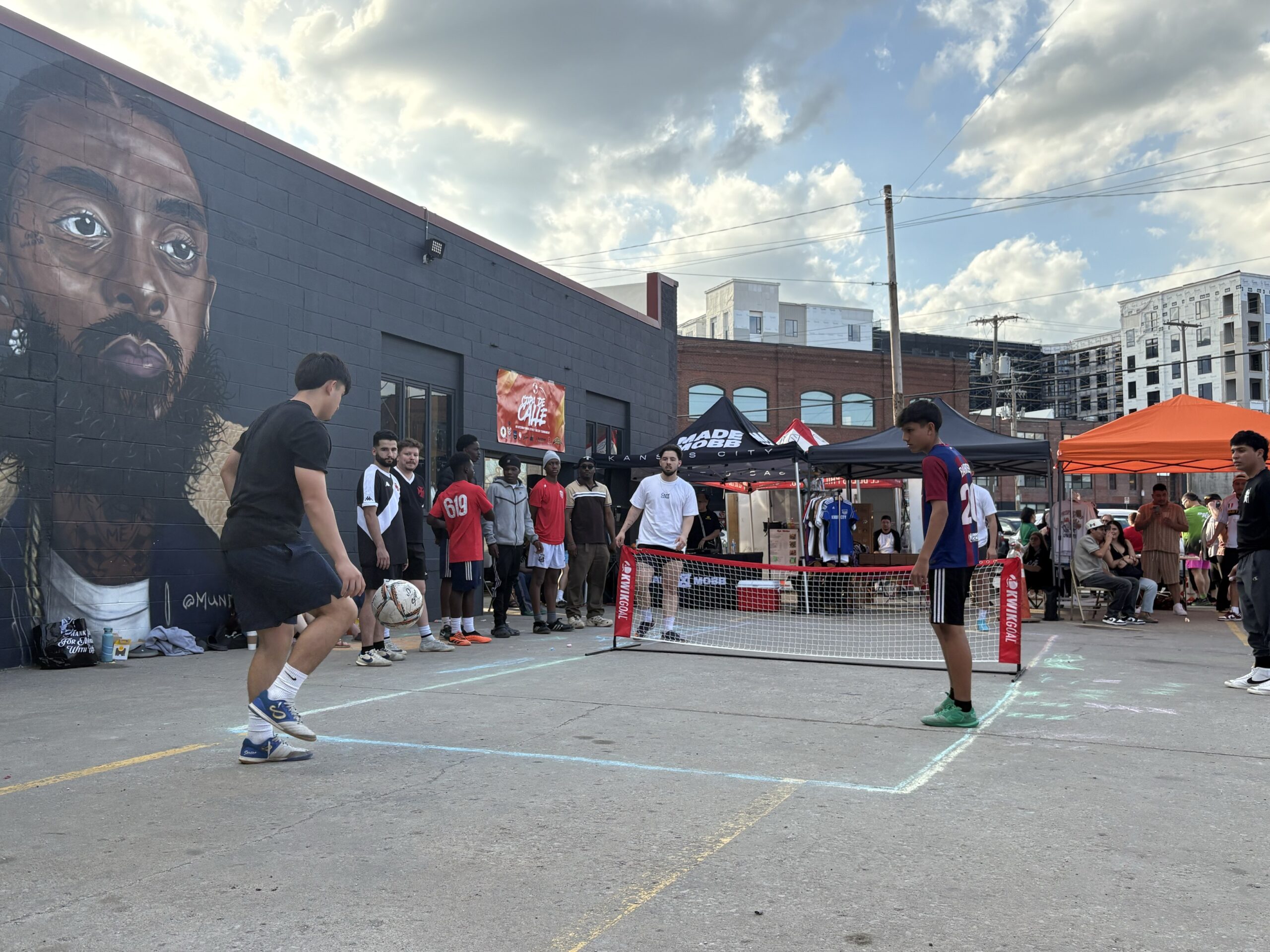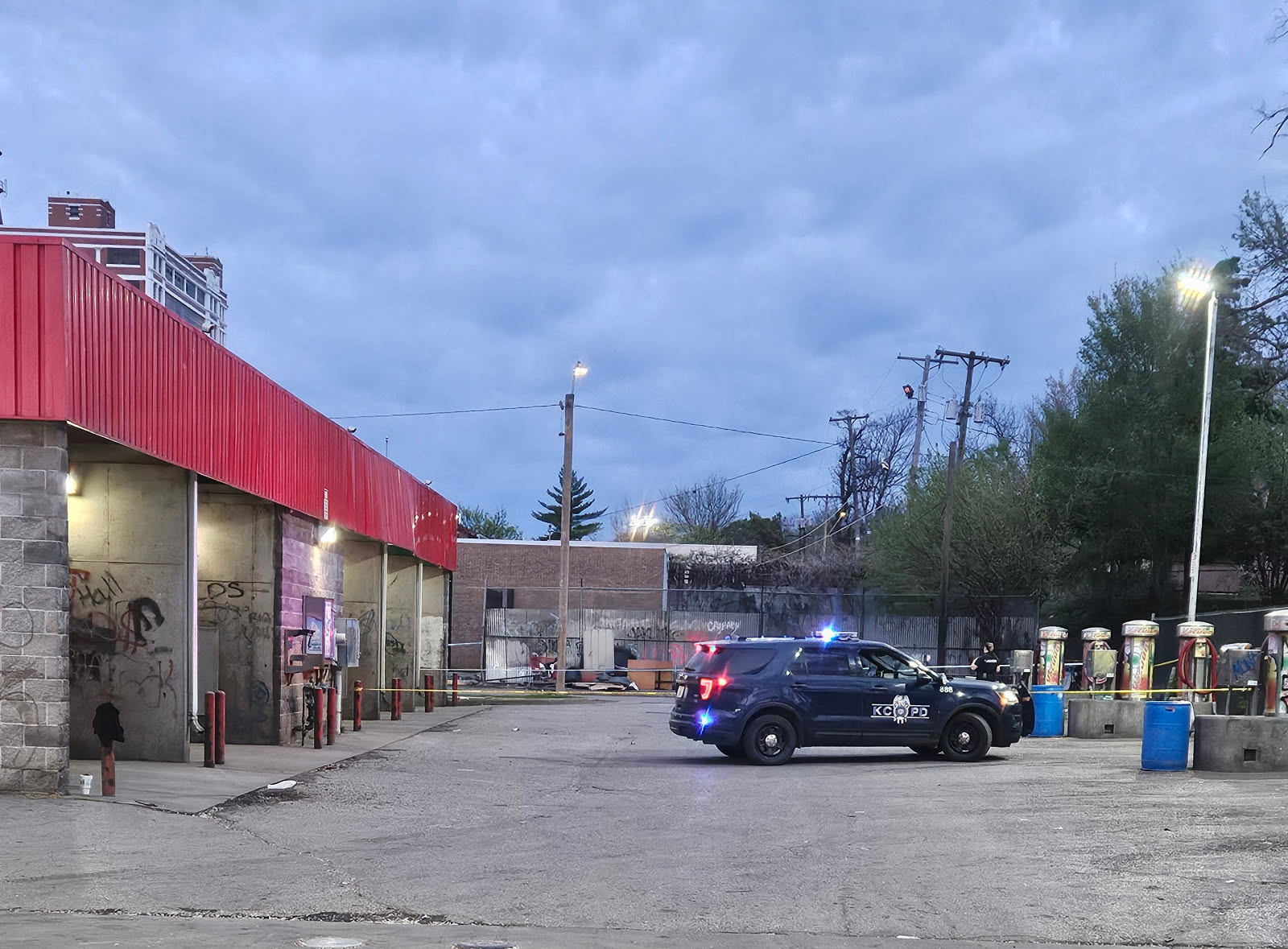
By Abby Hoover
Abdul Hatimi starts his day in the kitchen, preparing breakfast for the variety of customers who will soon trickle into his restaurant on Independence Avenue. What used to be a steady stream of immigrants looking for a taste of home, businessmen venturing out of downtown and Kansas Citians with adventuring taste buds has dwindled throughout the COVID-19 pandemic.
Named after his daughter, Yasmeen Cafe serves traditional East African and Mediterranean fare including sambusas, mandazi, and deliciously rich, piping hot chai tea lattes.
“In the morning, we start cooking breakfast, and then lunch,” Hatimi said. “Basically, mostly we do breakfast and lunch, and the lunch extends over to dinner.”
They serve breakfast from 8:30 until 11 a.m., then lunch until 8 p.m. six days a week, closing only on Sundays at 1447 Independence Avenue.
“Right now there’s not much employees available, so it cut down a lot of stuff on the menu because we’re really short staffed at the moment,” Hatimi said. “We used to do dinner and sandwiches and stuff but now cannot possibly have the capacity to do that anymore.”
Hatimi, his wife Khadija, and his cousin run the restaurant, and although they’ve pared down the menu, they’ve kept the really popular dishes and some personal favorites.
“The things that everybody wants, people like all the comfort, like the rice and chicken suqaar, the beef steak, goat and lamb, those are like everybody’s favorites so those are the things that we share,” Hatimi said.
For those who are new to East African food, Hatimi said rice should be the number one thing to try because it’s a staple of their diet.
“Some people are not very comfortable with goat because of the different – I don’t know, they don’t like – but the thing is, the goats we use are the young ones so they don’t have the goat smell at all,” Hatimi said. “But mainly people love chicken a lot, and beef and lamb. You should just try everything, you know?”
Surprising to those unfamiliar with the history of Somalia, Yasmeen Cafe also serves spaghetti.
“It’s a bit different from the American spaghetti and the Italian spaghetti,” Hatimi said. “We were colonized by the Italians.”
They also make a special dish, ugali, that is similar to polenta, with spinach and chicken, beef, fish or lamb. On Fridays, Saturdays and Mondays, they add white rice with coconut to the specials.
Hatimi said running a restaurant is rewarding, but hard.
“You have to do everything yourself,” Hatimi said. “It’s good now. When we started, it was a bit hard because we had to manually prep, but now at least we invested in some prepping machines and stuff that makes life much easier.”
Instead of spending nearly two hours chopping a 50 pound bag of onions, his machine can do it in under five minutes. Just when things were starting to get easier, the pandemic began spreading
Like many of his fellow international business owners on Independence Avenue, the pandemic put an unexpected strain on his restaurant.
“It is so hard, people were afraid of coming because – we understood the situation, it was out of panic,” Hatimi said. “Most people now are ready to go, getting better, now they’re starting to come.”
Hatimi said he had trouble getting any sort of government assistance, something many small businesses relied on to endure the pandemic.
“It’s been impossible to get the SBA loans to help us out,” Hatimi said. “We’ve been applying for like the last two years since it started, and nothing… So I don’t know, maybe this part of town is not very much getting the help. Because I think other restaurants have something, Westport, there’s something in that area. They were getting their loans approved so fast.”
Even with his wife Khadija as the majority owner of the restaurant, making it a minority-owned and woman-owned business, they were surprised their restaurant wasn’t a priority.
“This neighborhood isn’t the high priority to help,” Hatimi said. “Every time you submit something, they send it back. We call them, we said ‘Okay, give us three days,’ ‘Send us an email, get us this, wait two weeks,’ like one year just this.”
He’s talked to his friends who own restaurants in Westport, who got their grant applications approved in less than a month, and his friends in Northeast, who are having the same trouble as him.
While Yasmeen didn’t get government assistance, their regular customers have kept the restaurant open. Most of them have returned, slowly, over the past year.
“Most of the Somalis live around this area, and even the Somalis who live in other parts of town like the North, Overland Park, Kansas City, Kansas, most of their shopping is done on the side,” Hatimi said. “All the Halal stores are in this part of town, the Somali mall is in this part of town, the mosques. All their social stuff is in this part of town, so even if they live 20 miles away, they will still come here.”
Hatimi and many of his countrymen see Northeast Kansas City as their center locally, with three mosques in the historic neighborhoods.
When Hatimi arrived in Atlanta, Ga., in 2000, he was greeted by a large Somali community. But with the cost of living high, and lots of traffic, he began reaching out to friends in other cities.
“I had a friend who lived here, and he said in this part of town you don’t have to drive two hours to go to work,” Hatimi said. “Back in 2000, there was no traffic, you could cross downtown at eight in the morning without traffic.”
He came to Kansas City and immediately liked it, and enjoyed being able to be anywhere he needed in five minutes from his home at 12th and Benton.
“I’m a mechanical engineer, but for some reason I only did an engineering job for like maybe two or three years, and then when I came here I worked for CSA to be a technician for a few years, home appliances and stuff, then I got into the trucking business,” Hatimi said. “I bought a truck and I did the over the road trucking.”
Back then, the Somali community was not so big, but they gravitated toward each other. There were a couple hundred Somali families in the area, which made life much easier for a recent immigrant. Eventually, people heard of the strong, welcoming community and began moving to Northeast from other states.
“Especially when people come from Africa, and the organizations take people to different places like Florida, Pennsylvania, in those big cities you don’t see your community,” Hatimi said. “So the minute you settle, the first thing is always our community. Minneapolis is the biggest Somali community, but the weather there is really hard. Then Columbus has a lot of people, similar weather and a very big population. But here is just where people wanted to come and it’s really growing up.”
The growth of the Somali community in Kansas City over the past 20 years is tremendous. Hatimi knew a restaurant with traditional favorites would be a comfort to new Americans and those who have been here now for decades. Just like his son and four daughters, children are taught of their family’s homeland through food.
Still, through it all, he welcomed his friends to his place for meals. Eventually, he got married and started a family.
“It was really hard to have a married life and be on the road, so we were figuring out what to do,” Hatimi said. “I ended up doing some Uber for a while and then I did interpretation for a while, but all the time I was just looking for a place to open this place.”
He found the space where Yasmeen Cafe would someday open in 2013, and told the owner if he ever sold the place to let him know. Finally, in 2018, he purchased the space and dove into making it presentable – cleaning and freshening up everything floor to ceiling. Yasmeen Cafe opened in December of 2018, but took a brief hiatus during the early months of the pandemic.
“March 13 all the way to June,” Hatimi recalled. “We were only doing take-out, no more dining in, and then in August they allowed 85% dining so we just complied to the City’s rules and stuff that started with 50% and then steadily opened.”
Yasmeen Cafe caters meals for groups, but doesn’t deliver. They are a favorite of the Northeast Kansas City Chamber of Commerce for monthly member luncheons, and they’ve also catered for a Catholic college in Gladstone, and for various organizations and companies for around 100 people.
“We had to cater for the mayor because the city had a delegation from Egypt,” Hatimi said. “That was a very big deal and we did the catering, we had to deliver that.”
A lot of their dishes have been adopted to Western culture, and they remain open for American holidays, welcoming people who have nowhere else to go. However, they close for their religious festivals.
For Somalians, food is tied closely to culture.
“Our food, we have a lot of influence from Somalia, but I do Kenyan Somali food basically, because I lived in those two countries,” Hatimi said. “Most of the Somali food, the Kenyan food, is from Indians who settled over there, the Arabs, the Middle East, and then also the Italian influence.”
In a neighborhood that was historically filled with Italian immigrants, Hatimi wasn’t nervous about selling spaghetti.
“There’s one customer I have that used to come here every day, he’s an Italian man in his 60s, always used to come for rice,” Hatimi recalled. “One day we were out of rice, and I said we have spaghetti. ‘Look, I’m an Italian, so how’s your spaghetti?’ So I said, ‘You’ll be the judge for me.’ He said, ‘I’m hungry. I’ll just take it.’”
He took the spaghetti and fish, and for years that’s all he ate at Yasmeen Cafe.
The cultural connections don’t stop there. Hatimi serves biryani, a festival food from India and East Africa, on Fridays.
“They look at me like, just kind of, you know, it’s out of place, this biryani, this food is like really food for India, Pakistan,” Hatimi said. “You know, it doesn’t add up for them. One just told me ‘I’ll eat my mom’s biryani.’ He had rice and goat and somebody next to him had the biryani and the guy could not stop looking at that plate. He came to me saying this: ‘Can I please test your biryani? Can you give me a small portion?’”
When Hatimi opened his restaurant, he knew business, but he didn’t know it would be more than a business.
“The customers become your family,” Hatimi said. “So most of the guests here, they come in sometimes to request special things and stuff. So whenever I’m not busy, I’ll always make for them whatever they require.”
Most people who visit the restaurant call Hatimi “dad” and his wife “mom,” even if they’re older than the couple. And they take it as a compliment, knowing those familiarities are reserved for whoever feeds you and treats you like family.
“We just put a lot of happiness in our food,” Hatimi said. “You know, something that you need to try. A lot of people who come here – we have some clients from the court, from downtown, local people – when they taste it they really like it.”
To learn more about Yasmeen Cafe, visit their Facebook Page “Yasmeen Cafe,” call 816-216-1615, or email yasmeencafekc@gmail.com.
















